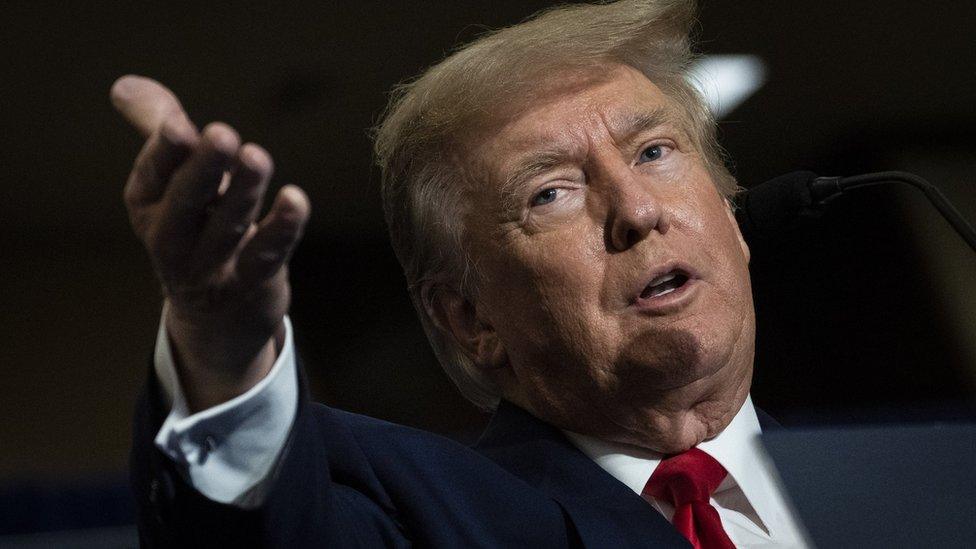What we learned from Trump's return to Washington
- Published

For the first time since he broke with tradition and left town before Joe Biden's presidential inauguration in January 2021, Donald Trump has returned to Washington DC.
In an address before Republican members of Congress and former administration officials at the America First Policy Institute summit, the former president set out what he believes should be the focus of the Republican party if they gain control of Congress in November and the presidency in 2024.
So, what did we learn?
A focus on crime
Mr Trump led with a seven-part plan for cracking down on what he said was rampant crime in cities across the US.
Some of the proposals were familiar, such as increasing liability protection for police officers, more funding for law enforcement and a return to stop-and-frisk policies that allow impromptu warrantless searches of suspects.
Others were somewhat new. He again called for the death penalty for drug dealers, but added praise for the "quick trials" that authoritarian countries like China use to combat the narcotics trade.
He suggested construction of government-run tent compounds outside of urban areas to rehabilitate homeless people so that American cities could again be "clean, safe and beautiful".
He also called for the presidential authority to deploy National Guard soldiers to fight crime in cities without a local governor's permission - harkening back to the clashes between the president and Democratic governors over whether to use US military forces during the sometimes violent Black Lives Matters protests in 2020.
The former president has always leaned into tough-on-crime rhetoric, but it's ironic that perhaps the biggest bipartisan policy achievement of his term in office was criminal justice reform, which granted thousands of prison inmates early release and revised federal sentencing guidelines.
Going off script
The first half of the former president's speech focused on crime, and as he ticked through his seven-part policy outline his delivery was monotone, almost as though he were bored by his own words. This was set-piece Trump, not the unscripted Trump from his raucous rallies.
Then he complained about how transgender athletes were allowed to compete in women's sports, and the audience gave him one of the largest cheers of the afternoon.
Mr Trump came to life.
"Sir, don't say that, it's very controversial," he said his advisers had told him about that line. "It's not written down anywhere, I just said it."
And it was off to the races. Mr Trump said he wanted to start a women's basketball team with NBA star LeBron James on it. He railed against Biden's immigration policies. He complained about the "China virus" and claimed that as president he had done the opposite of whatever federal infectious disease expert Anthony Fauci had recommended.
This was Mr Trump in his natural habitat, free to go wherever his mind took him.
A presidential hint
After listing a number of other policy prescriptions - stopping inflation, protecting parents' rights, making it easier to fire high-level federal employees, restoring free speech, bringing back manufacturing jobs and welfare reform - Mr Trump ventured back to a favourite pastime: complaining about the 2020 election results.
"I won a second time, did much better the second time," he said of his 2020 re-election effort. "Did a lot better. Very corrupt. We got millions, millions more votes. That's going to be a story for a long time, what a disgrace it was."
He groused that he was the "most persecuted president ever". He complained about his twin impeachments and the ongoing 6 January committee hearings. He defended his supporters who marched to the Capitol before its attack, saying many were being unfairly prosecuted and "tortured and handled so horribly".
"Something is going to have to happen," he said. "People are not going to take it much longer."
Earlier in the day, Mike Pence - Mr Trump's 2020 running mate - also gave a speech in Washington. When asked about whether there was a division within the Republican party, and whether he was attempting to draw distinctions between himself and his former boss, the former vice-president demurred.
"I don't know that our movement is that divided," he said. "I don't know that the president and I differ on issues. But we may differ on focus. I truly do believe that elections are about the future. And it is absolutely essential at a time when so many Americans are hurting, so many families are struggling, that we don't give way to the temptation to look back."
Clearly Mr Pence, who has 2024 ambitions of his own, sees Mr Trump's continued fixation with his election defeat as an opportunity. "Let's focus on the future" is a line he has repeated multiple times and in multiple ways as he has travelled the country, laying the groundwork for a potential presidential bid.
But if the former vice-president wants the White House in 2024, his path may have to go through his former boss, who once again hinted on Tuesday that his career in politics may not be over.
"We may just have to do it again," Mr Trump said of running for president. "We have to straighten out our country."
At one point, the crowd chanted "four more years".
The former president thanked them, adding that if he quit politics his enemies would leave him alone.
"But that's not what I do," he said. "I can't do that because I love our country, and I can't do that because I love the people of our country."
In other words, stay tuned.
